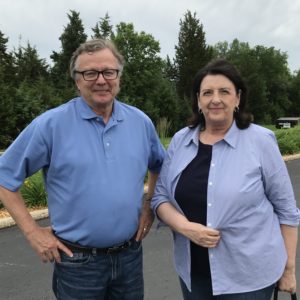SSGA talks export logistics at JOC Inland Distribution Conference
The outlook for U.S. exports and export shipper logistics challenges were the central focus of a key panel of experts at the Inland Distribution Conference held Oct. 21-23 in Chicago. The Specialty Soya and Grains Alliance (SSGA) was represented on the exporter panel.
There was record turnout for this year’s annual event, which focused on inland intermodal container shipping hosted by the Journal of Commerce (JOC)/IHS Markit. JOC is the leading international intermodal shipping news media source covering global trade, ocean shipping, rail and trucking drayage transportation for importers and exporters.
SSGA Strategic Advisor for Trade and Transportation Bruce Abbe participated in a panel discussion on export obstacles and opportunities looking at how U.S. trade disputes, tariffs and reciprocal tariffs on goods to and from China and other trading partners are challenging U.S. exporters as well as importers. Scott Sigman, transportation and export lead for the Illinois Soybean Association; Sean Mulford, trader and broker for Agniel Commodities; and Don Lake, senior vice president, Enterprise Development for Dunavant Logistics Group, a division of major cotton exporter Dunavant, were the other panelists.
Container export outlook
The North American economic and freight outlook is slowing, in line with a slow down in the world economy, putting a damper on the outlook for increased trade and related transportation, Paul Bingham, IHS economist, told conference attendees, citing several economic indicators.
However, if a new trade deal between the U.S. and China is finally inked, that could lead to a sharp increase in exports, shipping and logistics demand that could strain the transportation infrastructure, exporter panelists said.
The pending Phase One partial trade agreement between the U.S. and China has not yet been announced in detail. If an agricultural trade deal is confirmed, that could well spur exports of several commodities. However, the main commodity to most benefit will likely be whole soybeans that are shipped in bulk vessels to China, as opposed to containers.
One potential game changer for container shipping, Abbe noted, would be if a deal is made that gets rid of China’s current high tariffs on U.S. dried distillers grains (DDGS). In 2015, DDGS accounted for nearly one half of all containerized grain exports from the U.S., and made for a natural backhaul for containers to China for use by consumer goods manufacturers. China’s 80 percent tariff in 2015 dried up DDGS exports to China. U.S. exporters have largely been successful in diversifying to other markets – albeit with a decline in prices. Reopening China’s potential big demand for DDGS, which the U.S. Grains Council is pushing for, could add a big demand resurgence for the feed commodity.
Sigman and Abbe noted the U.S. soybean exporters have been making steady progress in diversifying to other markets as well, notably to Southeast Asia’s growing population countries, but the China market is too large to replace in short order. Meanwhile, China has ramped up its ag commodity purchases from South America.
The panelist all agreed that the impact from African swine fever is having a dampening demand on soy and grain export demand in China, and a further threat if it spreads wider across Asia.
Mulford was blunt that the U.S. needs to get serious about improving our own export infrastructure, citing the deteriorating status of our locks, dams and barge shipping infrastructure in particular. He noted it’s a stark contrast to the rapid export infrastructure development under way now in the Black Sea region.
Lake had a different take from earlier presenter’s forecasts of flat global trade next year keeping a lid on shipping demand. If the scope of the trade deal that’s talked about comes through and spurs quick new demand from China, he said we could see some major logistics challenges occur that the shipping industry is not ready for.
Shipping Logistics
Panel moderator Mark Szarkonyi, executive editor of JOC, asked Abbe about the need for additional intermodal shipping locations in the inland – a consistent message that SSGA has brought to these circles.
Abbe noted there are serious intermodal development initiatives underway in Wisconsin and North Dakota at this time, along with rumored developments in the works in other locations that could improve capacity for exporters. He encouraged ocean carriers and railroads to take a serious look at these developments, with an eye to helping them work for all parties.
Worsening congestion around the main inland container yards, increased trucking costs, and periodic shortages of trucking options are driving forces behind the new inland intermodal development initiatives, he noted.
Abbe also encouraged carriers and railroads to be more open and work with shippers and forwarders on container repositioning programs to make equipment more available where it is needed by exporters.
Detention and demurrage penalties at ports and terminals is another hot issue that came up. Mulford said it consumes a huge amount of time to sort these penalties out. A current Federal Maritime Commission initiative pushing for clarity and consistency in these procedures to minimize unfair penalties is welcomed by shippers.




